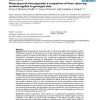Free Online Productivity Tools
i2Speak
i2Symbol
i2OCR
iTex2Img
iWeb2Print
iWeb2Shot
i2Type
iPdf2Split
iPdf2Merge
i2Bopomofo
i2Arabic
i2Style
i2Image
i2PDF
iLatex2Rtf
Sci2ools
BMCBI
2006
2006
Dissecting trait heterogeneity: a comparison of three clustering methods applied to genotypic data
Background: Trait heterogeneity, which exists when a trait has been defined with insufficient specificity such that it is actually two or more distinct traits, has been implicated as a confounding factor in traditional statistical genetics of complex human disease. In the absence of detailed phenotypic data collected consistently in combination with genetic data, unsupervised computational methodologies offer the potential for discovering underlying trait heterogeneity. The performance of three such methods
| Added | 10 Dec 2010 |
| Updated | 10 Dec 2010 |
| Type | Journal |
| Year | 2006 |
| Where | BMCBI |
| Authors | Tricia A. Thornton-Wells, Jason H. Moore, Jonathan L. Haines |
Comments (0)

